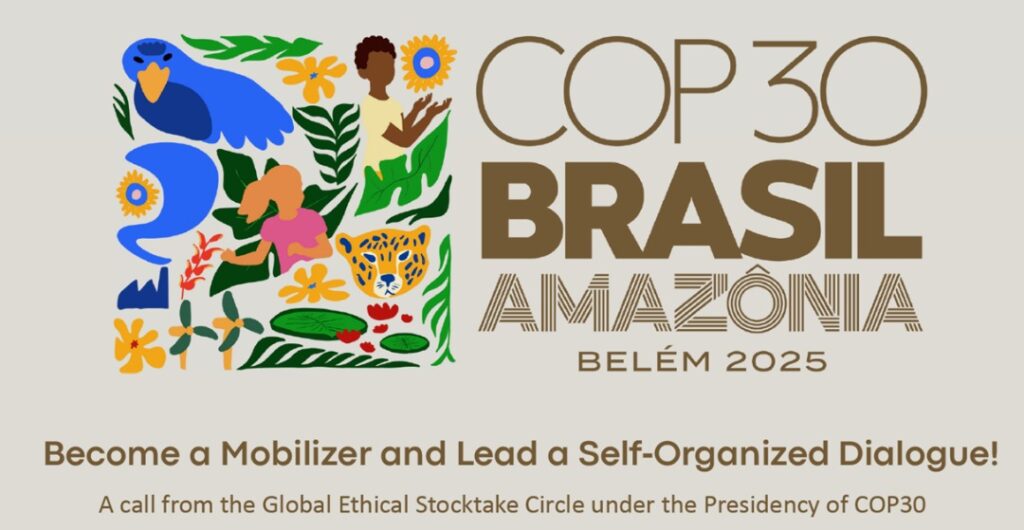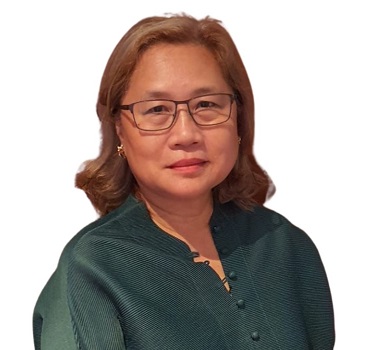
COP30: From Bangsar to Belem
By Yuet Mee Ho-Nambiar
Climate conferences usually conjure up images of suits, statistics, and endless policy debates. But something different is happening ahead of COP30 in Brazil this November—and it’s pretty exciting.
In response to a global call for a Global Ethical Stocktake (GES) , some friends in Kuala Lumpur self-organised a dialogue in Bangsar last month in September. This groundbreaking worldwide effort was jointly launched by Brazilian President Luiz Inácio Lula da Silva and UN Secretary-General António Guterres, and it’s asking a refreshingly honest question: “If we already know what needs to be done about climate change, why aren’t we doing it?”
Inspired by the Paris Agreement’s Global Stocktake, the GES proposes a global and ethical dialogue on the climate crisis, bringing together social, cultural, spiritual, business, scientific, and political leaders through intercontinental dialogues, as well as independent, society-led events. It is aimed to deliver a set of civil society contributions to COP30 to accelerate the implementation of the Paris Agreement and limit the increase in the planet’s average temperature to 1.5ºC above pre-industrial levels.
In other words, instead of diving straight into carbon targets and emission reductions (though those matter too—we need 43% cuts by 2030!), this approach recognises something we often forget: climate action isn’t just about technology and policy. It’s deeply personal and spiritual.
What makes this initiative special is how it flips the usual script. Rather than starting with what governments should do, it asks what we as communities and individuals can contribute.
Bangsar self-organised dialogue
So how did this Malaysian community end up part of this global conversation? The International Environment Forum (IEF) (https://iefworld.org/) was contacted to organise dialogues among its members worldwide. Through IEF’s Malaysian member, the Kuala Lumpur community got involved, showing how networks of engaged citizens can amplify grassroots voices on the world stage.
Twenty-three friends of diverse backgrounds – from 20 to 75 years old – reflected on the five guiding questions and explored how just principles like global unity and caring for future generations can guide climate solutions. The group used small group dialogues where participants tackled tough questions about local realities and practical responses—not just abstract global targets. The discussion moved from understanding to reflection to concrete steps, grounded in principles like “the earth is but one country, and mankind its citizens”, embracing an approach anchored on social justice and collective action.
Summary of our discussion
Here’s a summary of our reflections for each question:
Q1: Why do we deny climate science? Climate misinformation persists because people are treated as passive data recipients rather than active participants. Economic systems prioritise short-term growth over sustainability. Most critically, spiritual advancement hasn’t matched material progress, creating disconnection that prevents meaningful engagement with long-term planetary challenges.
Q2: Why continue harmful production/consumption models? Materialistic worldviews assume human selfishness, insulating decision-makers from consequences while vulnerable communities suffer. The “vulnerability gap” means those most affected have least power to influence change. Spiritual disconnection obscures true prosperity beyond material accumulation—encompassing wellbeing, relationships, and harmony with nature.
Q3: How to accelerate rich countries’ transitions? Establish binding international commitments like “Climate NATO” with differentiated responsibilities. Eliminate fossil fuel subsidies and reject carbon offsetting schemes that enable wealthy nations to avoid behavioural change. Implement debt-for-climate swaps and technology transfers. True action requires actual emission cuts, not financial mechanisms maintaining status quo.
Q4: What traditional practices teach environmental harmony? Cultural traditions demonstrate practical harmony: Malaysian Indian kolam art, indigenous agricultural techniques, harvest festivals expressing gratitude. Spiritual teachings emphasize stewardship—humans as trustees, not owners. The challenge is moving beyond “convenience-based environmentalism” to authentic harmony requiring spiritual grounding that aligns daily practices with stated values.
Q5: How to mobilize collective climate action? Transform people from passive recipients to active agents through community-centred approaches. Ground action in justice, humanity’s oneness, and interdependence—recognising each person as “trust of the whole.” Promote holistic education combining science with spiritual principles. Shift mental models from human dominance to interconnectedness, enabling sustainable policies and practices.
The Big Question asked by the Bangsar group
Given the diversity of valid but sometimes competing concerns around climate change, is it possible to find an underlying aspiration that motivates all movements for environmental and social justice?
Through its reflections, the group were reminded that spiritual teachings suggest this is possible through the central organising principle of the oneness of humanity—often understood through the metaphor of the human body.
Just as diverse individuals and social groups can be likened to the members of an organically interdependent body, our diversity becomes a source of strength and vitality. Central to this understanding is recognising that each member of the race is born into the world as a trust of the whole, and that the well-being of the whole ensures the well-being of the part. This perspective transforms climate action from individual burden to collective stewardship, where every person carries responsibility not only for their own actions but for the wellbeing of humanity and the planet. Such recognition eliminates the artificial divisions that often paralyse climate efforts, instead fostering a sense of shared accountability where local actions serve universal purposes and individual choices reflect care for the global community.
My concluding thoughts
What gives me hope: this GES isn’t happening in isolation. Communities around the world are hosting similar conversations, creating a grassroots network of voices that will feed into COP30. It’s democracy in action, with a spiritual dimension.
This surely is exactly what we need right now: soul-searching about how we can each be part of the solution. After all, climate change isn’t just an environmental crisis—it’s a test of our collective character. In the words of GES, “This is not just a technical or policy challenge. It’s fundamentally an ethical and spiritual crisis that requires transformation of “values, behaviours, and responsibilities.” …achieving climate goals requires more than technical solutions; it demands a fundamental shift in how we relate to each other, future generations, and the natural world.
It’s grassroots engagement that might just be the missing piece in our climate puzzle.

Guided by personal ethics of ‘do more good’, Yuet Mee Ho-Nambiar has a long involvement with sustainability and community building activities. Belief in the oneness of humanity and the nobility of man underpins her interest in matters relating to unity and social cohesion of communities, while her background in a finance-related profession focuses her interest to the area of inclusive economics and development.
The views expressed here are that of the writer’s and not necessarily that of Weekly Echo’s.